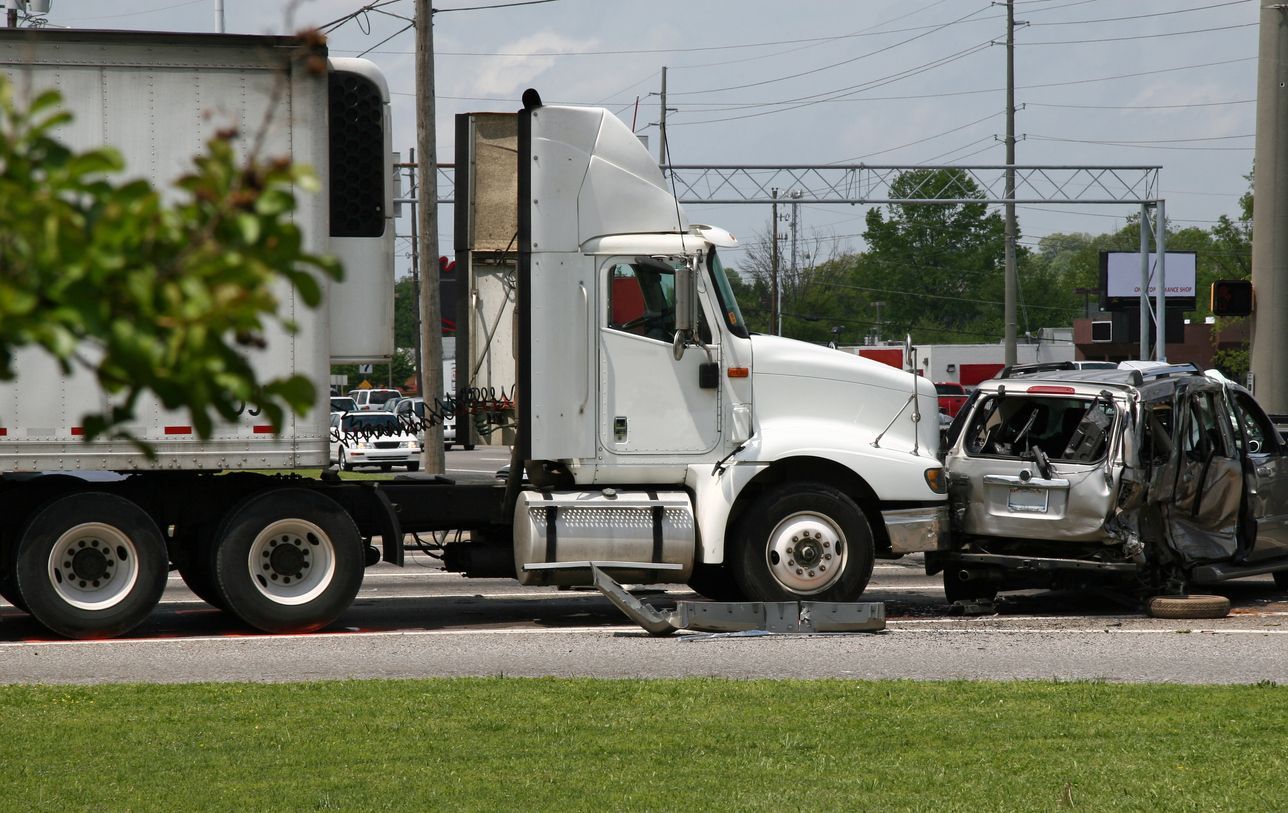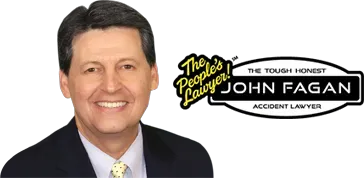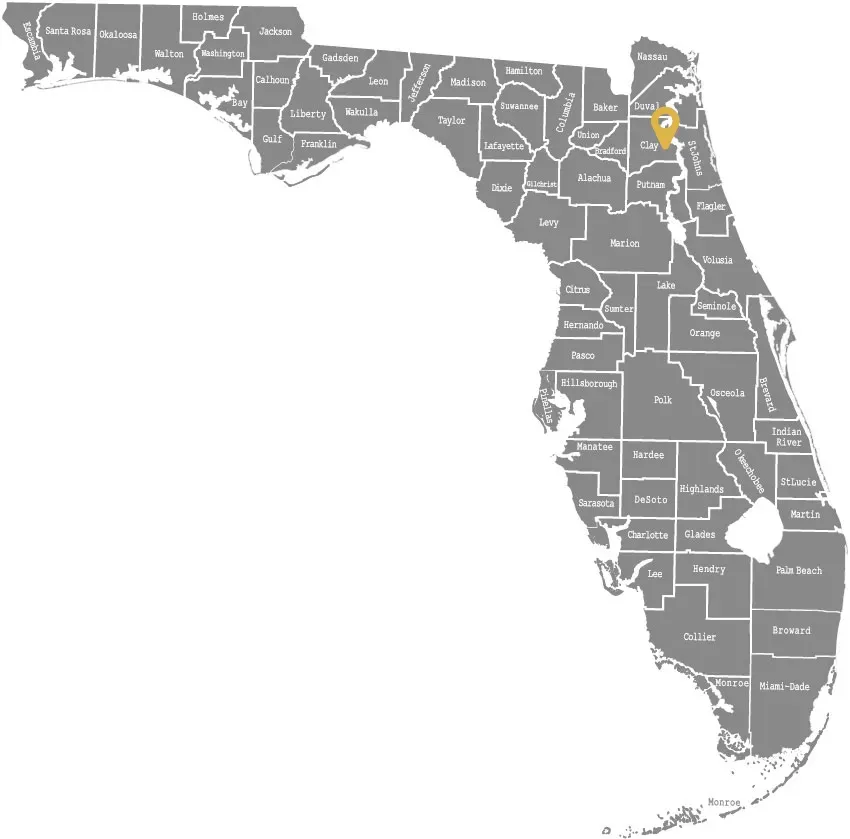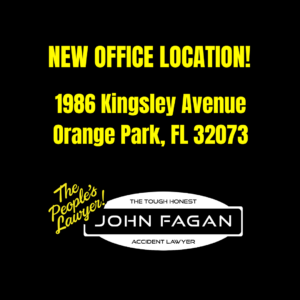Tractor Trailer Accident Lawyer
Tractor Trailer Auto Accident Attorney

Serving Palatka, Orange Park, Starke, and Middleburg
In most vehicle accidents resulting in injury, you will try to collect damages from the person who caused your accident (or from their insurer). Tractor trailer accidents can be different, though, because liability is not always so clear-cut. Being prepared for a tractor trailer accident and working with an auto accident attorney in Orange Park, Fl., when a crash does occur can help you get the compensation you deserve.
Orange Park FL and Surrounding Areas
Depending on the facts of your case, liability can fall on the company that employed or contracted the driver, the company that manufactured the tractor trailer, or a company that performed repairs on the tractor trailer. In some cases, the tractor and the trailer will be owned by separate companies, which complicates the question of liability further.
An auto accident attorney in Middleburg, FL, will be able to advise you on all the possible defendants in your case and which ones are the most likely to be found liable for your accident. Even if the driver is the person most obviously responsible for your accident, it might be a better idea to go after his employer if your injury is serious or results in permanent disability because the driver might not have the financial resources to fully compensate you.
Tractor Trailer Auto Accident Attorney Middleburg FL and Surrounding Areas
Florida has a law called the “dangerous instrumentality doctrine,” which says that a vehicle’s owner can be held responsible for damages caused by another person driving his vehicle, as long as the driving was done with the owner’s knowledge and consent. This law originally applied to injuries caused by “dangerous tools,” but in 1938, the Florida Supreme Court extended it to cover motor vehicles. The “dangerous instrumentality doctrine” does not just apply to employers but to anyone who lets another person borrow his or her car.
There is another legal theory called “respondent superior,” which applies to employers specifically. It says that if a driver causes an accident within the scope of his employment, the driver’s employer can be held liable for any damages caused by the accident. The laws governing a Florida tractor trailer accident can be complex, but an experienced First Coast tractor trailer attorney can help you sort through the legal issues involved.
Workers’ Comp Filing Deadlines in Florida
It is imperative you file a claim with your employer as soon as possible for your injuries. There is a deadline for filing. You have 30 days from the date of the accident to report your injuries and accident to your employer. In turn, your employer will report your claims to the Florida Division of Workers’ Compensation and its insurance carrier. You have two years after reporting to file for benefits but you should file immediately.
Because the timeframe is strict for reporting a workplace injury, notify your employer as soon as you see signs of an illness or have an injury from an accident at work. Failure to report your injuries to your employer could forfeit your workers’ compensation benefits. We can assist you in filing a claim with the division and make sure you are eligible for benefits under the law.
Eligibility Requirements for Workers’ Compensation in Florida
We serve Orange Park, Palatka, and Middleburg, Starke and Gainesville, Florida. You will be afforded coverage if you are hurt while on the job. Injury rates can vary, and your employment type does not matter. Under Florida law, all employers must provide coverage to their employees for injury-related accidents regardless of their status. This means that full-time, part-time, as well as temporary employees are entitled to Workers’ Comp benefits.
In Florida, the only type of employee exempt from an employer’s workers’ compensation coverage are independent contract employees. These employees are not considered direct workers of the company. The laws for workers’ compensation in the state do not cover these types of employees. Consult with us so we can determine if you are eligible for benefits for your injuries.
All accidents are also covered by workers’ compensation, regardless if the employee made an error that caused the accident. The only time that Florida does not provide benefits for injuries sustained as a result of an on-the-job injury is if the employee was under the influence of alcohol or drugs. Violation of doing workplace rules can nullify eligibility and prevent benefits from being paid.
Workers’ Comp Coverage in Florida
There are several types of benefits paid to employees injured from a work-related accident. Workers’ Comp benefits pay for medical bills as well as provide income if you are unable to work because of your injuries.
Any treatment received for your injuries must be provided by an approved medical professional cleared by your employer and their insurance provider. This will allow for complete coverage of your medical care and ensure paid expenses for your medical coverage. Failing to see a doctor that has been approved by your employer can result in non-payment of your medical expenses. These expenses would have to be paid by you out-of-pocket, with no benefits provided to cover the costs.
Medical Benefits in Florida
As part of your workers’ compensation benefits, you may seek medical care for any injuries that were sustained during a workplace accident. Your benefits also include payment for:
- All necessary medical treatment
- Visits to your doctor
- Hospital stays to treat your injuries
- All medical tests related to caring for your injuries
- All necessary physical therapy
- Prescription drugs needed for your illness or injury
- Any prostheses obtained
In addition, your workers’ compensation benefits also provide payment for the cost of traveling to and from your doctor. Mileage reimbursement is also paid for trips to and from your pharmacy under the law.
Lost Wage Benefits in Florida
When you are unable to work because of your injuries, you are entitled to lost wage compensation through workers’ compensation. This pays a portion of your wages that you were unable to earn because you were recovering from your injury or if the severity of your injury renders you unable to return to work.
The Florida Division of Workers’ Compensation determines your wage payout based on the severity of your injuries and its impairment to your ability to work. The classifications for lost wage benefits are as follows:
Temporary Total Disability in Florida
When your injuries prevent you from working in any capacity, you will be eligible for up to 66 2/3 percent of your regular wage earnings through the workers’ compensation program. This is subject to a state maximum and depending on the severity of your disability, may be as much as 80 percent of your earnings as determined by the division. In these instances, paid benefits occur for up to six months.
Payment for lost wages due to a temporary total disability will not be paid for the first seven days of disability or missed work unless your injury extends over 21 days. Then the compensation becomes retroactive and pays from the first day of missed work. If your disability lasts less than 21 days, payments occur for the time missed after seven days.
Permanent Total Disability in Florida
If your injuries resulted in permanent total disability, you might qualify for additional benefits. A permanent total disability rating means your injuries are so severe that you are unable to work in any capacity permanently. Your permanent impairment rating must be higher than zero percent. Then, your injuries will be rated, and compensation will be determined based on their severity. This takes place under the Bureau of Monitoring and Audit. A Florida workers’ compensation lawyer can help you understand what type of benefits you can expect with your permanent total disability injuries as determined by the bureau.
Death Benefits in Florida
If you pass away as a result of a workplace accident, your family and dependents are eligible for your workers’ compensation benefits. This can include deaths that occurred within one year of the incident or after five years of disability because of the accident. Your family may be eligible for benefit payments up to $150,000. Your family may also receive funeral compensation up to $7500. Florida also provides for education benefits to be paid to a surviving spouse as outlined by the law.
Denial of Benefits in Florida
When you are denied benefits by the workers’ compensation insurance carrier, you need a Florida workers’ compensation lawyer to intervene. They can contact the Employee Assistance Office (EAO) as a first? step in obtaining your benefits. The EAO may resolve your issues, or you may file a petition for benefits with the Office of Judges of Compensation Claims. Here, your processed application for appeal schedules a hearing with the Judge of Compensation Claims.
Within 40 days of your petition filing, a meeting with the Judge of Compensation Claims occurs. In most cases, you will need to be examined by an independent medical examiner prior to the hearing. They will assess your injuries and report their findings to the Judges of Compensation Claims.
At your pretrial hearing, you will need to make a case for the severity as well as the long-term effects of your injuries. You may be required to present medical documentation as to your inability to work and any disability you have obtained. Having a Florida workers’ compensation lawyer represent you at this time would be beneficial, as they are well-versed in the workers’ compensation appeals process. They know what to expect at the pretrial hearing. You may also want to consider having your doctor testify on the severity of your injuries and their limiting effects.
Following the pretrial hearing, the judge will decide on your case within 30 days. If the denial of your claim occurs, you may take further action by filing an appeal with the First District Court of Appeals in Florida. Your attorney can help prevent the need for additional appeals, as they will assist you in being prepared to present and prove your case at the initial pretrial hearing. This can help reduce the timeline for receiving benefits and also ensure you receive the compensation you are entitled to.
How Could a Workers’ Compensation Lawyer Help My Case?
Your Florida workers’ compensation attorney may also try to resolve your case through alternative dispute resolution. This mediation process can help settle your claim without the need to go to court. The ADR works to find a solution that works well for both you and your employer. This can allow you to go back to work if possible while still receiving benefits from your injuries. This is often a lower-cost solution that insurance companies will agree to while still providing benefits and coverage for your injuries.
Filing an appeal with the First District Court of Appeals can be a challenging process to endure for any individual. Having a workers’ compensation lawyer in Florida on your side can help. They will represent you in court and present your case in a concise and comprehensive manner. Going through this process alone can risk your eligibility to receive workers’ compensation benefit as well your total settlement award.
Consult with a Florida Workers’ Compensation Lawyer Today
Having workers’ compensation lawyers to help you navigate the legal process will ensure swift results as well as the best opportunity to receive compensation for your injuries that is fair. You will have an easier time with your claim and reduce the chances of denial of your injury complaint. A Florida workers’ compensation lawyer will know the proper procedures to follow as well as the law according to the workers’ compensation program.
When you are in need of help with your workers’ compensation claim, contact John Fagan to speak with an experienced FL workers’ compensation lawyer. A skilled attorney can advise you of your legal rights in relation to the injuries you have sustained while on the job. They can file your claim quickly and accurately and help you receive fair compensation for your injuries that occurred while you were working. Get started today by scheduling a consultation.

GET A FREE CASE REVIEW
Quick Links
FAQ
Frequently Asked Questions
Why is John Fagan Attorney so Popular?
In Orange Park, finding a dedicated and experienced tractor trailer accident lawyer is essential when you're unexpectedly thrust into the chaos of an accident. At our firm, we focus on taking the confusion and worry off your back, handling everything from medical treatment to insurance paperwork. As experienced tractor trailer accident lawyers , we pride ourselves on delivering exceptional personal service that battles insurance companies with your best interests in mind. Each tractor trailer accident lawyer in our team is deeply committed to ensuring you receive the necessary compensation for your injuries. Trust in our track record and let our tractor trailer accident lawyer guide you to a brighter, stress-free future. With our expertise, you won't have to navigate the legal landscape alone—we are your devoted tractor trailer accident lawyers here to support you every step of the way.
How is a tractor-trailer accident case different from a car accident case?
The main difference is weight. A fully loaded commercial truck can weigh upwards of 70,000 pounds, compared to a car, which usually weighs 3,000 pounds. This means that the consequences of a truck accident can be much worse than a regular car accident. A trucking accident lawsuit is also handled quite differently. There are more parties involved and different regulations to follow.
What exactly makes a truck a “commercial truck”?
If a large truck is used to transport goods and/or supplies, it can be considered a commercial truck. Semi-trucks, 18-wheelers, panel vans, delivery trucks, tankers, dump trucks, and other similar large vehicles could all be considered commercial trucks.
I was involved in a trucking accident in Florida, but I live in Georgia. Where do I file my claim?
In these sorts of accidents, you are allowed to file a claim in either the state the accident occurred or in the state that the trucking company does business in or is located in.
Do trucking companies have specific regulations that they have to follow?
Yes. There are guidelines that trucking companies must follow. The Dept. of Transportation’s FMSCA regulates the federal trucking rules for the U.S. trucking industry. Federal trucking laws are also supplemented by laws established in the state of Florida by the Florida Dept. of Transportation. Some of the things regulated are as such:
- Amount of hours that truck drivers can operate.
- Truck driver qualifications.
- Trucking company’s safety guidelines.
- Size limitations such as weight and width.
- Emission and noise standards.
- Truck maintenance and repairs.
- Truck inspections.
Who do I file my claim against, the trucking company or the driver?
If the truck driver is an employee of a company, then you might be able to file a claim against the company directly. However, many truck drivers are contractors, not employees. In that instance, it might be more difficult to prove the trucking company was involved in any wrongdoing.
“There’s Never a Fee Unless
We Get Money For You!”


